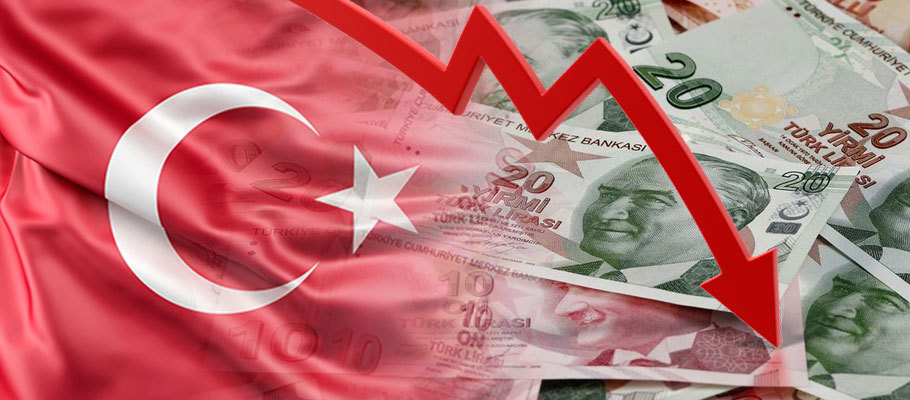
Published: October 30th, 2020
Turkey’s embattled currency, the lira, has lost close to 30 per cent of its value since the start of the year, and broke through the crucial 8-to-the-dollar threshold this week, prompting market watchers to ponder how much further policymakers will let the fiat slide.
The latest market data shows Turkey's Lira, now enduring its eighth straight year of losses, has lost more than 80 per cent of its value over the past ten years.
Analysts at BlueBay Asset Management noted the similarities to the runup to 2018 when the country's economy went into a tailspin. Market watchers are now wondering how low the Lira can go, and if the country’s central bank will be forced to ask President Erdogan for an emergency rate hike.
The country’s cash reserves are being burned up by deficits, with efforts to support the Lira gouging a notable hole in the central bank's war chest. Analysts at Goldman Sachs believe monetary policymakers in Ankara intervened in markets with injections totalling $16 billion in August alone.
Traditional central bank arithmetic dictates that a country’s cash reserves should be sufficient to cover three months of imports. Ankara is currently forecast to dip below 2.7 months before year-end.
Societe Generale’s currency unit said in a note this week that Turkey’s forex reserves are no longer adequate to cover vital imports, risking price hikes and unrest in an already restive region.
Ankara is embroiled in several regional conflicts: Libya, Syria, and more recently in the conflict between Armenia and Azerbaijan over the disputed Nagorno Karabakh province. Turkey's geopolitical tangles and affiliations mean it’s often at loggerheads with one or another major power.
The latest standoff between the Turkish and French governments over France’s treatment of Muslims has done little to calm nerves in jittery markets. And with U.S. President Donald Trump (and sometime Erdogan ally) potentially on the way out after November’s presidential elections, new sanctions could be in the offing, adding pressure to Turkey's already strained markets.
RaboResearch commented this week that if opinion polls wrong, and President Trump is re-elected on Nov. 3, the battered Lira might see some respite from its extended fall. ‘As things stand, however, the lira is on the precipice of total meltdown,’ analysts said.
Monetary policy experts believe Turkey's public debt burden is manageable. Still, in the private sector, its most prominent banks and corporations face are struggling with large repayments that amounted to over $13 billion in Q3 2020. November will be a telling month for the country's financial institutions, which have $3.6 billion in repayments. A devalued lira will put pressure on those businesses and banks when they need to roll over their hard-currency debt.
The Lira's latest crunch is perhaps the best evidence the country’s central bank missed an opportunity last week to shore up its reputation amongst forex traders.
As the currency crashed below the 8-per-dollar threshold at the start of the week, a snowstorm of gloomy indicators for risk assets followed. The biggest worry for investors, however, is still reluctance by central bankers to implement an interest-rate increase that would prove to markets it's serious about stopping the fiat’s depreciation.
In a note to investors, analysts at Medley Global Advisors in London said that Turkey’s central bank is mostly to blame for the Lira's current woes. ‘Central bankers reap what they sow, and very publicly. It's undeniable that central bank has caused confusion and indicated policy drift recently and it's driven yet another huge currency selloff.’
The Lira dropped in value by as much as 1.8 per cent to 8.0987 per greenback and had traded down 1.5 per cent at mid-week; posting the largest weekly dip of any emerging-market fiat and cementing a dismal nine-week run of depreciation. That's the Lira's most extended rout since 1999. Istanbul’s benchmark Borsa 100 Index dropped by 3.8 per cent on the news.
Turkey’s central bank also upset investors when it unexpectedly held fast on interest rates last week, a move that stopped a brief recovery in its tracks. Ankara’s monetary regulator had already burned through the country’s foreign-exchange reserves at a pace exceeding all other major developing economies. Foreign investors have sold $13.2 billion worth of Turkish bonds and equities this year, the most massive selloff since 2005.
BlueBay Asset Management in London told journalists at Bloomberg that Ankara was experiencing a ‘Groundhog Day’ event that threatens a repeat of 2018. Outside-investor interest in Turkish assets is being degraded, the firm’s analysts said, by a chain of geopolitical risks, with Ankara facing potential American sanctions over the purchase of a missile system from Russia, alongside its involvement in territorial disputes in the Caucasus and the eastern Mediterranean.
Rumours are now circulating that government-owned lenders have sold close to $800 million in lira-backed assets this week. However, it’s difficult to confirm as Turkish state banks are prohibited from commenting publicly on interventions in the foreign exchange market.
Last week, President Erdogan practically dared the U.S. government to punish the country for its purchase of Russian S-400 missile defence systems. He also sharpened his criticism of Europe’s treatment of Muslims, directing his ire at French PM Emmanuel Macron by suggesting he needed to see a psychiatrist help. He also urged Turkish citizens to boycott French goods.
Markets have responded badly to the diplomatic row with France. The Lira has lost more than 25% this year, the worst-performing currency in emerging markets after the Brazilian real.